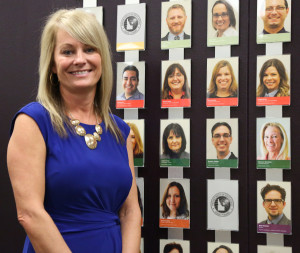State superintendent Sherri Ybarra’s goal to mold the State Department of Education into a service organization is widely known and supported throughout her office, an external audit has found.

Ybarra discussed that vision during the 2014 campaign, and repeated it during interviews before taking office.
Auditors from the Council of Chief State School Officers identified Ybarra’s aspirations as one of the top bright spots in a “capacity review” that Ybarra requested earlier this year.
On the other hand, the report identified several weak spots, including communication issues and progress monitoring.
The May 22 report, “Understanding your organizational capacity to deliver on your goals,” relied on auditors’ visit to Boise, interviews with State Department of Education staff, teachers, Lt. Gov. Brad Little and education groups.
“The department’s aspirations are widely known,” the report found. “Nearly all SDE staff understand and agree with service-orientated approach emphasized by the new administration: supporting schools and students to achieve. At a high level, people can answer the question ‘what is the department trying to do?’”
As state superintendent, Ybarra is a member of the CCSSO, a nonpartisan Washington, D.C.-based organization composed of state education department heads.
Ybarra has spoken positively about the organization during multiple interviews with Idaho Education News, and said working with that group, and other state school chiefs, is educational and empowering.
She also valued the audit findings.
“I was getting feedback that we could actually use in the field, and it wasn’t feedback that, maybe, necessarily that I wanted to hear,” Ybarra said. “It was true and honest and it was feedback that was nonconflicting and in an nonthreatening environment.”
Auditors identified a number of challenges — including internal communication problems and complaints that “many” members of Ybarra’s SDE staff and education groups at large don’t feel they have had appropriate contact with and exposure to Ybarra.
“Many SDE staff have not had contact with (Ybarra) or feel uniformed about decisions that affect them,” the report found.
Ybarra said she has taken the findings to heart, and is developing a strategic plan to address each challenge auditors identified. She also said her initial focus upon taking office in January was the 2015 legislative session, which dominated her focus to the point she could not sit down to meet with her staff, as she would have preferred.
Ybarra promised to work to change that and to keep her staff in the loop.
“It was an item that I realized I needed to work on,” Ybarra said. “One of the strategies from the strategic plan that we have created, which is being refined right now, is that we will have an all-staff meeting day in which staff have access to the state superintendent.”
Ybarra said her meetings with the staff will be “a protected work day” and take place monthly. She said the meetings would be similar to collaborative professional development days educators regularly participate in, but offer a chance for staffers to get to know her and pose questions.
The CCSSO audit also praised Ybarra’s staff, saying the State Department of Education team “possesses the skill and will to deliver on the goals of the department” and that camaraderie and cohesiveness exist throughout the agency. The team also received high marks for their handling of the Idaho Education Network crisis that dominated the early part of the legislative session.
But auditors expressed concerns about how Ybarra’s team can monitor progress towards their service and support goals. “Staff often cannot say ‘How we are going to do it,’ or ‘How will we know if we are on track?’”
The report also delved into data issues, saying staff operations have “yet to be translated into using data to understand what is working and what is not and making decisions accordingly.”
This week, Ed News specifically asked Ybarra about her expectations for data validity and accuracy. Multiple school administrators have said they purposely submitted identical teacher evaluation data to the state or manipulated state reports to suggest all teachers earned identical evaluations, even though district data indicated otherwise.
Ybarra did not directly answer the question, saying journalists don’t always understand the whole evaluations picture or the multiple domains and elements that factor in evaluations.
When pressed to respond to a statement from Sugar-Salem Superintendent Alan Dunn — who said he submitted identical and inaccurate data out of privacy concerns — Ybarra declined. Evaluations, she said, are “a very emotional topic” and “a hot-button item.”
